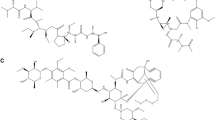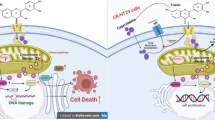Abstract
The most prevalent malignancy among women is breast cancer. Phytochemicals and their derivatives are rapidly being recognized as possible cancer complementary therapies because they can modify signaling pathways that lead to cell cycle control or directly alter cell cycle regulatory molecules. The phytochemicals’ poor bioavailability and short half-life make them unsuitable as anticancer drugs. Applying PLGA-PEG NPs improves their solubility and tolerance while also reducing drug adverse effects. According to the findings, combining anti-tumor phytochemicals can be more effective in regulating several signaling pathways linked to tumor cell development. The point of the study was to compare the anti-proliferative impacts of combined artemisinin and metformin on cell cycle arrest and expression of cyclin D1 and apoptotic genes (bcl-2, Bax, survivin, caspase-7, and caspase-3), and also hTERT genes in breast cancer cells. T-47D breast cancer cells were treated with different concentrations of metformin (MET) and artemisinin (ART) co-loaded in PLGA-PEG NPs and free form. The MTT test was applied to assess drug cytotoxicity in T47D cells. The cell cycle distribution was investigated using flow cytometry and the expression levels of cyclin D1, hTERT, Bax, bcl-2, caspase-3, and caspase-7, and survivin genes were then determined using real-time PCR. The findings of the MTT test and flow cytometry revealed that each state was cytotoxic to T47D cells in a time and dose-dependent pattern. Compared to various state of drugs (free and nano state, pure and combination state) Met–Art–PLGA/PEG NPs demonstrated the strongest anti-proliferative impact and considerably inhibited the development of T-47D cells; also, treatment with nano-formulated forms of Met-Art combination resulted in substantial downregulation of hTERT, Bcl-2, cyclin D1, survivin, and upregulation of caspase-3, caspase-7, and Bax, in the cells, as compared to the free forms, as indicated by real-time PCR findings. The findings suggested that combining an ART/MET-loaded PLGA-PEG NP-based therapy for breast cancer could significantly improve treatment effectiveness.









Similar content being viewed by others
Data availability
The data that support the findings of this study are available from the corresponding author, upon reasonable request.
References
Amirsaadat, S., Jafari-Gharabaghlou, D., Alijani, S., Mousazadeh, H., Dadashpour, M., & Zarghami, N. (2021). Metformin and Silibinin co-loaded PLGA-PEG nanoparticles for effective combination therapy against human breast cancer cells. Journal of Drug Delivery Science and Technology, 61, 102107.
Jafari-Gharabaghlou, D., Pilehvar-Soltanahmadi, Y., Dadashpour, M., Mota, A., Vafajouy-Jamshidi, S., Faramarzi, L., Rasouli, S., & Zarghami, N. (2018). Combination of metformin and phenformin synergistically inhibits proliferation and hTERT expression in human breast cancer cells. Iranian Journal of Basic Medical Sciences, 21, 1167.
Javan, N., Khadem Ansari, M. H., Dadashpour, M., Khojastehfard, M., Bastami, M., Rahmati-Yamchi, M., & Zarghami, N. (2019). Synergistic antiproliferative effects of co-nanoencapsulated curcumin and chrysin on mda-mb-231 breast cancer cells through upregulating mir-132 and mir-502c. Nutrition and Cancer, 71, 1201–1213.
Samadzadeh, S., Mousazadeh, H., Ghareghomi, S., Dadashpour, M., Babazadeh, M., & Zarghami, N. (2021). In vitro anticancer efficacy of Metformin-loaded PLGA nanofibers towards the post-surgical therapy of lung cancer. Journal of Drug Delivery Science and Technology, 61, 102318.
Chatran, M., Pilehvar-Soltanahmadi, Y., Dadashpour, M., Faramarzi, L., Rasouli, S., Jafari-Gharabaghlou, D., Asbaghi, N., & Zarghami, N. (2018). Synergistic anti-proliferative effects of metformin and silibinin combination on T47D breast cancer cells via hTERT and cyclin D1 inhibition. Drug Research, 68, 710–716.
Adlravan, E., Nejati, K., Karimi, M. A., Mousazadeh, H., Abbasi, A., & Dadashpour, M. (2021). Potential activity of free and PLGA/PEG nanoencapsulated nasturtium officinale extract in inducing cytotoxicity and apoptosis in human lung carcinoma A549 cells. Journal of Drug Delivery Science and Technology, 61, 102256.
Mogheri, F., Jokar, E., Afshin, R., Akbari, A. A., Dadashpour, M., Firouzi-amandi, A., Serati-Nouri, H., & Zarghami, N. (2021). Co-delivery of metformin and silibinin in dual-drug loaded nanoparticles synergistically improves chemotherapy in human non-small cell lung cancer A549 cells. Journal of Drug Delivery Science and Technology, 66, 102752.
Nikmanesh, F., Sarhadi, S., Dadashpour, M., Asgari, Y., & Zarghami, N. (2020). Omics integration analysis unravel the landscape of driving mechanisms of colorectal cancer. Asian Pacific Journal of Cancer Prevention: APJCP, 21, 3539.
Wei, Q.-Y., He, K.-M., Chen, J.-L., Xu, Y.-M., & Lau, A. T. (2019). Phytofabrication of nanoparticles as novel drugs for anticancer applications. Molecules, 24, 4246.
Khazei, K., Jamali, M., Sarhadi, S., Dadashpour, M., Shokrollahzade, S., & Zarghami, N. (2022). Transcriptome profiling of curcumin-treated T47D human breast cancer cells by a system-based approach. Gene Reports, 27, 101556.
Pourgholi, A., Dadashpour, M., Mousapour, A., Amandi, A. F., & Zarghami, N. (2021). Anticancer potential of silibinin loaded polymeric nanoparticles against breast cancer cells: Insight into the apoptotic genes targets. Asian Pacific Journal of Cancer Prevention: APJCP, 22, 2587–2596.
Gao, F., Sun, Z., Kong, F., & Xiao, J. (2020). Artemisinin-derived hybrids and their anticancer activity. European Journal of Medicinal Chemistry, 188, 112044.
Salmani Javan, E., Lotfi, F., Jafari-Gharabaghlou, D., Mousazadeh, H., Dadashpour, M., & Zarghami, N. (2022). Development of a magnetic nanostructure for co-delivery of metformin and silibinin on growth of lung cancer cells: Possible action through leptin gene and its receptor regulation. Asian Pacific Journal of Cancer Prevention, 23, 519–527.
Alimova, I. N., Liu, B., Fan, Z., Edgerton, S. M., Dillon, T., Lind, S. E., & Thor, A. D. (2009). Metformin inhibits breast cancer cell growth, colony formation and induces cell cycle arrest in vitro. Cell Cycle, 8, 909–915.
Lei, Y., Yi, Y., Liu, Y., Liu, X., Keller, E. T., Qian, C.-N., Zhang, J., & Lu, Y. (2017). Metformin targets multiple signaling pathways in cancer. Chinese Journal of Cancer, 36, 1–9.
Li, B., Bu, S., Sun, J., Guo, Y., & Lai, D. (2018). Artemisinin derivatives inhibit epithelial ovarian cancer cells via autophagy-mediated cell cycle arrest. Acta Biochimica Et Biophysica Sinica, 50, 1227–1235.
Guan, X., & Guan, Y. (2020). Artemisinin induces selective and potent anticancer effects in drug resistant breast cancer cells by inducing cellular apoptosis and autophagy and G2/M cell cycle arrest. JBUON, 25, 1330–1336.
Dadashpour, M., Ganjibakhsh, M., Mousazadeh, H. and Nejati, K. (2022). Increased pro-apoptotic and anti-proliferative activities of simvastatin encapsulated PCL-PEG Nanoparticles on human breast cancer adenocarcinoma cells. Journal of Cluster Science, 1–12.
Mousazadeh, H., Pilehvar-Soltanahmadi, Y., Dadashpour, M., & Zarghami, N. (2021). Cyclodextrin based natural nanostructured carbohydrate polymers as effective non-viral siRNA delivery systems for cancer gene therapy. Journal of Controlled Release, 330, 1046–1070.
Serati-Nouri, H., Jafari, A., Roshangar, L., Dadashpour, M., Pilehvar-Soltanahmadi, Y., & Zarghami, N. (2020). Biomedical applications of zeolite-based materials: A review. Materials Science and Engineering: C, 116, 111225.
Firouzi-Amandi, A., Dadashpour, M., Nouri, M., Zarghami, N., Serati-Nouri, H., Jafari-Gharabaghlou, D., Karzar, B. H., Mellatyar, H., Aghebati-Maleki, L., & Babaloo, Z. (2018). Chrysin-nanoencapsulated PLGA-PEG for macrophage repolarization: Possible application in tissue regeneration. Biomedicine & Pharmacotherapy, 105, 773–780.
Mellatyar, H., Talaei, S., Pilehvar-Soltanahmadi, Y., Dadashpour, M., Barzegar, A., Akbarzadeh, A., & Zarghami, N. (2018). 17-DMAG-loaded nanofibrous scaffold for effective growth inhibition of lung cancer cells through targeting HSP90 gene expression. Biomedicine & Pharmacotherapy, 105, 1026–1032.
Tabatabaei Mirakabad, F. S., Nejati-Koshki, K., Akbarzadeh, A., Yamchi, M. R., Milani, M., Zarghami, N., Zeighamian, V., Rahimzadeh, A., Alimohammadi, S., & Hanifehpour, Y. (2014). PLGA-based nanoparticles as cancer drug delivery systems. Asian Pacific Journal of Cancer Prevention, 15, 517–535.
Eslami, S. S., Jafari, D., Montazeri, H., Sadeghizadeh, M., & Tarighi, P. (2021). Combination of curcumin and metformin inhibits cell growth and induces apoptosis without affecting the cell cycle in LNCaP prostate cancer cell line. Nutrition and Cancer, 73, 1026–1039.
Turkekul, K., Colpan, R. D., Baykul, T., Ozdemir, M. D., & Erdogan, S. (2018). Esculetin inhibits the survival of human prostate cancer cells by inducing apoptosis and arresting the cell cycle. Journal of Cancer Prevention, 23, 10.
Ozretic, P., Alvir, I., Sarcevic, B., Vujaskovic, Z., Rendic-Miocevic, Z., Roguljic, A., & Beketic-Oreskovic, L. (2018). Apoptosis regulator Bcl-2 is an independent prognostic marker for worse overall survival in triple-negative breast cancer patients. The International journal of biological markers, 33, 109–115.
Pu, X., Storr, S. J., Zhang, Y., Rakha, E. A., Green, A. R., Ellis, I. O., & Martin, S. G. (2017). Caspase-3 and caspase-8 expression in breast cancer: Caspase-3 is associated with survival. Apoptosis, 22, 357–368.
Yuan, X., Larsson, C., & Xu, D. (2019). Mechanisms underlying the activation of TERT transcription and telomerase activity in human cancer: Old actors and new players. Oncogene, 38, 6172–6183.
Patel, S., Singh, N., & Kumar, L. (2015). Evaluation of effects of metformin in primary ovarian cancer cells. Asian Pacific Journal of Cancer Prevention, 16, 6973–6979.
Chen, J., Zhang, L., & Hao, M. (2018). Effect of artemisinin on proliferation and apoptosis-related protein expression in vivo and in vitro. Saudi Journal of Biological Sciences, 25, 1488–1493.
Javidfar, S., Pilehvar-Soltanahmadi, Y., Farajzadeh, R., Lotfi-Attari, J., Shafiei-Irannejad, V., Hashemi, M., & Zarghami, N. (2018). The inhibitory effects of nano-encapsulated metformin on growth and hTERT expression in breast cancer cells. Journal of Drug Delivery Science and Technology, 43, 19–26.
Author information
Authors and Affiliations
Contributions
Writing — original draft preparation: Nasim Hassani and Davoud Jafari-gharabaghlou; editing: Mehdi dadashpour; conceptualization, supervision: Nosratollah Zarghami.
Corresponding author
Ethics declarations
Consent to Participate
Not applicable.
Consent to Publication
Not applicable.
Competing Interests
The authors declare no competing interests.
Additional information
Publisher's Note
Springer Nature remains neutral with regard to jurisdictional claims in published maps and institutional affiliations.
Rights and permissions
About this article
Cite this article
Hassani, N., Jafari-Gharabaghlou, D., Dadashpour, M. et al. The Effect of Dual Bioactive Compounds Artemisinin and Metformin Co-loaded in PLGA-PEG Nano-particles on Breast Cancer Cell lines: Potential Apoptotic and Anti-proliferative Action. Appl Biochem Biotechnol 194, 4930–4945 (2022). https://doi.org/10.1007/s12010-022-04000-9
Accepted:
Published:
Issue Date:
DOI: https://doi.org/10.1007/s12010-022-04000-9




